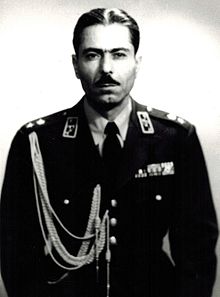Hassan Alavikia
Hassan Alavikia ( Persian حسن علویکیا, [hæsæn ɛ ælævikiːjɒː]; * December 1, 1912 in Hamadan , Iran ; † April 20, 2013 in La Jolla , California ) was a prominent general during the Pahlavi dynasty in Iran and a co-founder of SAVAK .
Origin and youth
Alavikia's father, Abu Torab Alavikia, was a wealthy landowner. He completed his school days at the Lycée St. Louis in Isfahan and Tehran , where he graduated from high school. In 1932 he began studying at the Tehran Military Academy and graduated as a lieutenant in 1934. He then continued his legal education at the University of Tehran . He was fluent in Persian, French, English and German.
Political career
From 1949 to 1951 he served in the Iranian Army as Deputy Director of the Iranian Intelligence Service and the Military Intelligence Service. In 1956 he left the military intelligence service and founded the Iranian Organization for Security and Information of the Country (SAVAK) with General Teymur Bakhtiar and General Hassan Pakravan . From 1956 to 1961 he was the deputy chief responsible for internal affairs. With Hassan Pakravan as deputy chief in charge of foreign affairs and General Teymur Bakhtiar as SAVAK's first director. In 1962, Alavikia was named as head of the European division of SAVAK. At that time its headquarters were in Cologne, Germany. In 1967 he retired from the military and continued his career building several successful companies in the agricultural industry.
exile
On January 16, 1979, he and his wife left Iran to visit their daughters in Paris . However, due to the Islamic Revolution , he stayed in France. He spent the rest of his life in exile in Paris and southern California.
He died on April 20, 2013 in La Jolla, California.
Family and private
On December 6, 1956, Alavikia married Jila Pourrastegar, the daughter of Hossein Pourrastegar, a prominent colonel in the Persian Cossack Brigade under Reza Shah Pahlavi. They had three daughters, Tannaz, Golnaz and Farnaz.
Individual evidence
- ↑ Ramy Nima: The Wrath of Allah: Islamic Revolution and Reaction in Iran . Pluto Press, 1983, ISBN 0861047338 , p. 36.
- ↑ a b Abbas Milani: Eminent Persians: The Men and Women Who Made Modern Iran, 1941-1979 . Syracuse University Press, 2008, ISBN 0815609078 .
- ↑ Kayhan London "سرتیپ علویکیا درگذشت" (PDF; 231 kB), Kayhan London , London, May 2-8, 2013.
- ↑ Habib Ladjevardi: Reference Guide to the Iranian Oral History Collection . Harvard University, Center for Middle Eastern Studies, Iranian Oral History Project, 1988, ISBN 0932885047 .
- ↑ a b Ladjevardi, Habib. "Hassan Alavi-Kia. Interview recorded by Habib Ladjevardi, March 1, 1983, Paris, France. Iranian Oral History Collection, Harvard University." , Harvard University , Paris, France, March 1, 1983.
- ↑ Abbas Milani: The Shah . Macmillan, 2011, ISBN 0230115624 , p. 122.
- ↑ Gholam Reza Afkhami: The Life and Times of the Shah . University of California Press, 2008, ISBN 0520942167 , pp. 381-382.
- ^ Kristen Blake: The US-Soviet Confrontation in Iran, 1945-1962: A Case in the Annals of the Cold War . University Press of America, 2009, ISBN 0761844953 , p. 107.
- ↑ Ghanei Fard, Erfan. "داستان ساواک و 'ژنرال' حسن علویکیا" , BBC , London, 8 de mayo 2013.
- ↑ Akbar E'temad: Alavi-Kiya, General Hasan . Foundation for Iranian Studies. May 1983. Retrieved June 5, 2013.
- ↑ Ghanei Fard, Erfan. "ناگفته هايي از ساواك" , Kurd Tabnak , Washington DC, April 28, 2013.
- ↑ Reading the Shah, and Ayatollahs in Tehran and What the US Should Learn from the History . Omid Memarian. January 24, 2011. Retrieved June 3, 2013.
| personal data | |
|---|---|
| SURNAME | Alavikia, Hassan |
| ALTERNATIVE NAMES | حسن علویکیا |
| BRIEF DESCRIPTION | Iranian general during the Pahlavi dynasty |
| DATE OF BIRTH | December 1, 1912 |
| PLACE OF BIRTH | Hamadan , Iran |
| DATE OF DEATH | April 20, 2013 |
| Place of death | La Jolla , California |
